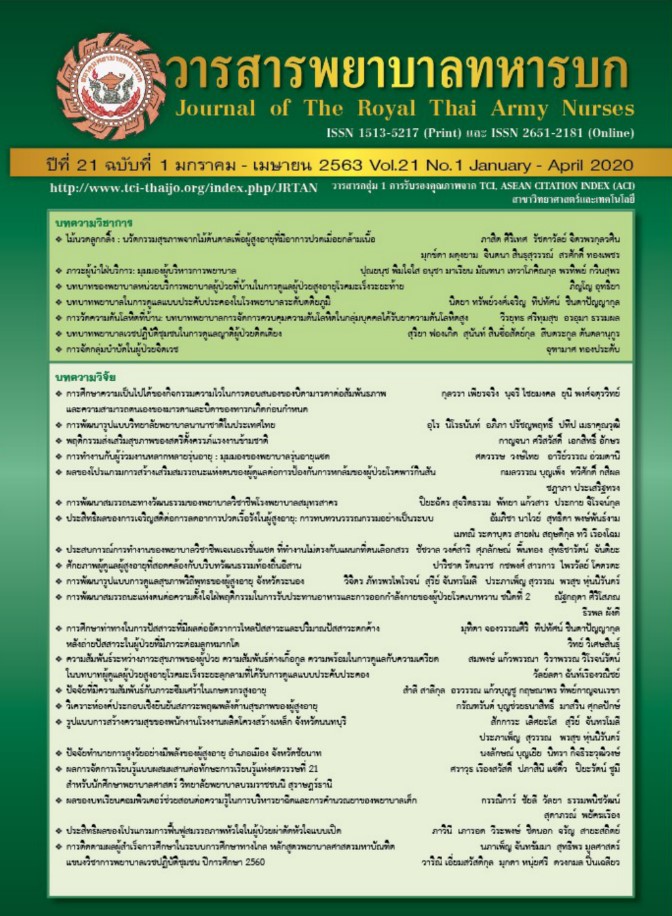Experience of Generation Z Nursing Professional Do Not Like the Department of Worked
Keywords:
professional nurse, generation Z nurses, new generation nursesAbstract
This descriptive qualitative research aimed to describe experience of generation Z nursing professional do not like the department of worked using Edmund Husserl phenomenology approach. Key informants were 26 generation Z nursing professional do not like the department of worked. Recruited by purposing sampling and snowball method from a public hospitals and private hospitals in Bangkok, Thailand. Data were collected through in-depth interviews, observations, and tape record. Clolaizzi approach and Atlas ti 6.1 program for content analysis was used to analyze data in this study.
Research results: Experience of generation Z nursing professional do not like the department of worked could be categorized into 5 major themes: 1) Even though do not like the department of worked must do it first because there is no right to choose, that is, the informant accepts funding to work after graduation therefore had to work in the department that the hospital provided. 2) Patiently work in a department that doesn’t like it first, hoping to move to work in the department that you like. 3) Even though it is a department that he does not choose, he is willing to continue working because he sees the opportunity to advance in his duties. 4) Friends are influential to the ideas and decisions of generation Z nurses in choosing work after graduation. and 5) The misunderstandings of people in the department are the factors that cause generation Z nurses to resign faster.
Downloads
References
Sladek S, Grabinger A. Gen Z. Introducing the first Generation of the 21st Century Available at https://goo.gl/Iu5o2t [accessed December 2016]. 2014.
Wongsaree C. Clinical in Adult Nursing Practicum Course for Generation Z Collegian. Journal of Boromarajonani College of Nursing, Bangkok.2015;31(2):130-140. (In Thai)
Snow EL., Jackson GT., & McNamara DS. (2014). Emergent behaviors in computer-based learning environments: Computational signals of catching up. Computers in Human Behavior, 41,62-70.
Ozkan M, Solmaz B. Mobile addiction of generation z and its effects on their social lifes:(An application among university students in the 18-23 age group). Procedia-Social and Behavioral Sciences. 2015;205:92-8. doi. 2015.09.027.
Wongsaree C. Documentation of Academic Training Topic Adult Learning: Learning and Understanding Generation Z Nursing Students, February 6, 2018, at Boromarajonani College of Nursing Suratthani[Internet].2018[Cited 2018 June 7]. Available from https://www.Slideshare.net/ssuserf6c0c6/generation-z-86892820.pdf
Srisupun W., & Sawaengdee K. Policy proposal to solve the shortage of professional nurses in Thailand. Journal of Nursing Council. 2012;27(1): 5-12. (In Thai)
Nei D., Snyder LA., Litwiller BJ. Promoting retention of nurses: a meta-analytic examination of causes of nurse turnover. Health care management review. 2015;40(3):237-53.
Husserl E. Phenomenology and the crisis of philosophy: Philosophy as a rigorous science, and philosophy and the crisis of European man. 1965.
Colaizzi PF. Psychological research as the Phenomenologist views it.In Existential Phenomenological Alternatives for Psychology(Valle R. & King M. eds), Oxford University Press, London. 1978.
Denzin NK. Triangulation 2.0. Journal of mixed methods research. 2012;6(2):80-8.
Faculty of Nursing, Prince of Songkla University. (2018). The Scholarship of Faculty of Nursing, Prince of Songkla University A.D. 2018. [Internet].2018[Cited 2018 June 12]. Available from https://www.nur.psu.ac.th/nur/file_unit/64020170321152503.doc
Khunthar A. The Impacts and Solutions to Nursing Workforce Shortage in Thailand. Journal of Nursing.2014;32(1):81-90. (In Thai)
The Nursing Association of Thailand. Code of Conduct 2003: Bangkok. The Institute for the Development of ASEAN Public Health Mahidol University. 2015. (In Thai)
Sweet J. & Swayze S. The Multi-Generational Nursing Workforce: Analysis of Psychological Capital by Generation and Shift. Journal of Organizational Psychology.2017; 17(4):19-28.
Chaiyaratana C. & Arpaichiraratana C. Ergonomics for Creating Safety Workplace on Nurse. Journal of Nursing Science and Health.2015; 38(3): 146-155. (In Thai)
Chaleoykitti,S & Thaiudom,A. Development Plan for Future Nursing Leadership. Journal of the Royal Thai Army Nurses.2014; 148-154. (In Thai)
Downloads
Published
How to Cite
Issue
Section
License
บทความหรือข้อคิดเห็นใดใดที่ปรากฏในวารสารพยาบาลทหารบกเป็นวรรณกรรมของผู้เขียน ซึ่งบรรณาธิการหรือสมาคมพยาบาลทหารบก ไม่จำเป็นต้องเห็นด้วย
บทความที่ได้รับการตีพิมพ์เป็นลิขสิทธิ์ของวารสารพยาบาลทหารบก
The ideas and opinions expressed in the Journal of The Royal Thai Army Nurses are those of the authors and not necessarily those
of the editor or Royal Thai Army Nurses Association.






